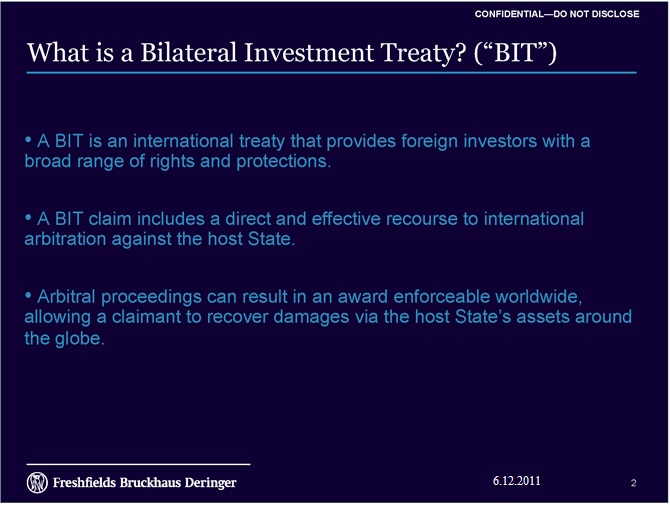Bilateral investment treaty
Investment Protection Agreement (English International Investment Treaties and International Investment Agreements) are international agreements between states. They provide direct investment by foreign natural or legal persons ( eg companies) in a foreign country legal protection, particularly against property impairing measures such as expropriation without compensation. Investment protection agreements are often completed as bilateral agreements ( Bilateral Investment Treaty, BIT). However, there are also regional agreements with relevant regulations.
- 7.3 Collisions between European Law and International Investment Law
Control background
Except by investment protection agreement investments in international law to be protected by two other mechanisms, namely, by the customary international law rights of foreigners and investors through contracts with the host State (Investor - State Treaty). However, both mechanisms have shortcomings that make additional protection through investment protection agreements necessary: claims of the stranger laws, only the home state of the investor by way of diplomatic protection assert, but not the investor itself whether the investor a claim against his home state to pursue the diplomatic protection has, is governed by its national law, most states do not provide for such a claim. In contrast, the protection is better planned by an investor-state contract for the investor. The problem remains, however, that these contracts traditionally subject to the national law of the host State and the host State thus in spite of the contract remains the possibility to change the legal framework to the detriment of the investor.
Both deficits are trying to compensate for investment protection agreements: First, they give the investor the ability to sue for violations of safety standards before an international arbitration directly against the host state and without the involvement of the home country. In addition, investment protection agreements constitute international agreements, so that the host State can not evade its obligations through its national legislative resources.
History and Development
Forerunner of the investment protection agreement were different friendship, trade and navigation treaties that existed between individual states in earlier centuries. These contracts contained, among other provisions partly investment protective regulations.
The first investment protection agreement today type have been developed in the fifties (particularly of the Federal Republic of Germany ) and is typically completed between a developed country and a developing or emerging country.
In 1965 the International Centre was established to Settlement of Investment Disputes (ICSID ) to register the agreement. This method have joined so far about 150 countries.
After the fall of the "Iron Curtain" in 1989 there was a wave of new contracts concluded so that nowadays are about 3000 such contracts in force worldwide. Only the Federal Republic of Germany has bilateral investment protection agreements with 130 countries.
In addition to the investment protection agreement can be found in international law of investment protection provisions in a number of regional trade agreements (eg, NAFTA, MERCOSUR ) as well as in international conventions, such as the WTO ( TRIPS, GATS, TRIMs Agreement). An attempt to replace the increasingly confusing world system of thousands of investment protection agreements with a single multilateral agreement is the end of the nineties, with the failed Multilateral Agreement on Investment ( MAI) within the OECD for the time being.
While older investment protection agreements are essentially limited to the protection of existing investments, refer newer contracts, increasingly, the upstream issue of market access, ie the possibility for permission to make a foreigner a particular investment in its scope. Particularly large extent this is the case concluded by the U.S. investment protection agreements.
Standards
Although the current agreement in content have great similarities should be noted that the contracts in detail can be designed differently. In the following, therefore, only general concepts can be illustrated, but again can be found in most agreements. In addition to the general promise to create favorable conditions for investment, investment protection agreements contain a number of specific obligations for the host State of an investment. Here, absolute and relative welfare standards can be distinguished:
Absolute protection standards
- Protection against unlawful expropriation (English protection from unlawful expropriation )
The expropriation facts in investment protection agreements codify the customary international law expropriation protection of the stranger laws. The (additional) codification explained partly by the fact that the existence of the foreign legal obligations of the representatives of the Calvo Doctrine was contested in the 20th century and to the extent required a contractual clarification. In addition, the foreign legal claim, other than claims arising out of investment protection agreements, only be asserted by way of diplomatic protection. It should be noted that the property protection in investment protection agreement (as opposed to human rights treaties ) only the value of property protected, but not its existence: The agreements represent only conditions to be met by an expropriation, they do not prohibit the expropriation per se but just. Among the conditions laid down in the agreements legality conditions regularly heard the action in the public interest, a non- discriminatory character, adherence to due process (English due process ), and the payment of an immediate, adequate and effective compensation.
- Fair and equitable treatment ( engl. fair and equitable treatment)
Because of its conceptual distance a violation of fair and equitable treatment standard in investment process is made very often argue. Some investment protection agreements, such as NAFTA, explicitly set the standard with the international minimum standard equal. In the case law, the standard is often classified as Legitimate facts, asking if you have according to whether the State has justifiable expectations ( engl. legitimate expectations ) the investor has disappointed, for example, in which the state acts inconsistent over previously given assurances.
- Comprehensive protection and safety (English full protection and security )
This standard is intended to fill a gap in protection, which arises from the fact that states are not generally responsible for all actions emanating from their territory. So are investments such as also be protected against insurgents. The default constituted a guarantee obligation, so that a state omission may constitute a violation. However, the standard only obligated to the State a possible and reasonable action (English due diligence), so it is not as a guarantee.
- Umbrella clauses (English umbrella clause )
Through an umbrella clause, the host State committed against the home state of the investor to the fact that he - is all the obligations it has entered into with the investor comply with - the host state. Examples of such obligations are investor-state contracts or other representations. Umbrella clauses are in practice problematic in several respects: First, attribution issues can occur if the state has not acted directly against the investor, but by a company controlled by him national private company. Moreover, the ratio of claims under the Investment Protection Agreement (English treaty claims) to claims arising from investor-state contracts (English contract claims) problematic because using a shield clause can potentially any simple breach of contractual duty be upgraded to a breach of the Agreement.
- Law relating to the transfer of profits ( engl. transfer of funds )
This standard is intended to prevent a host country builds a foreign investment on the condition that it scooped profits may not leave the country.
Relative Standards
- National treatment (german national treatment )
The standard of national treatment is violated if the foreign investor has been treated worse over domestic investors in a similar situation. This can be both to legal and factual inequalities. In literature and case law does not finally resolved is the question of what requirements are to provide a justification for unequal treatment.
- MFN ( most favored nations treatment engl. )
While the national treatment the subject is compared to a domestic investor in the MFN a comparison to a foreign investor is made. Very problematic is the question of whether the MFN principle, the investor opens the possibility to make more favorable regulations from another investment protection treaty benefits without the need for a concrete difference in treatment with an individual other investor: Basically, the investor from country A compared to country B can only rely on the agreement between A and B. The MFN principle could now allow him to rely on more favorable provisions in the Agreement between State B and State C, even if there is no concrete treated better investor from State C. In practice, this problem occurs in particular in the context of dispute settlement clauses.
Conflict between investment protection and government regulation
Legal policy investment protection agreement is partially charged, they would limit the regulatory scope of the host countries unreasonable. It should be noted in this context, first, that most (older) agreements do not contain a list of exceptions for government regulation, as it is known, for example, Article XX of GATT. The state regulatory interest is therefore predominantly discussed in connection with the protection of the standard ( indirect ) expropriation. In literature, state practice and case law is undisputed that the expropriation event in investment protection agreements the host countries to access foreign assets does not prohibit, but linked from the expropriation threshold certain conditions to the international legality. It is accordingly the question of the conditions under which a regulation constitutes an expropriation and thus compensation is to be paid as a prerequisite legality. It can be used in both literature and case three approaches differ: Some is held that a regulation could never constitute an expropriation (radical police powers doctrine). Others make the existence of an expropriation depends on which effects the regulation on the Investor has ( sole effect doctrine). Finally partially balance the interests of investors with the regulatory interests of the state is required ( moderate police powers doctrine).
As the debate over the state's right to regulate some states have their model BITs, based on which new investment protection agreements are negotiated to complemented an exemption clause. As an alternative to such an exception clause is proposed in investment protection agreement on the protection of property rights in human rights treaties in the literature, the approximation of property protection.
Legal position of the Investors
See the most investment protection agreements for the investor before a right of action before an international arbitration tribunal. The investor can thus make a violation of protection standards in the investment protection agreement, regardless of the country of origin and its diplomatic interests. Not finally clarified is whether the investor makes it own subjective rights, or merely the rights of his home state. The question of ownership is practically particularly relevant if the host state as a defendant referring to it, the investor had agreed in an investor-state contract to stage all disputes with respect to the investment before a contractually stipulated court. This contractual agreement could then be a waiver (English waiver ) of the investor with respect to the rights constitute ( or in any case of dispute settlement mechanisms ) from the investment protection agreements, where you look at the investor as a holder, and thus as to the waiver beneficiaries.
Recognition and enforcement
Suffers a foreign investor damage to its investments based on a breach of investment protection obligations of the host State, the latter may sue the foreign state before an international arbitration tribunal. The competent court of arbitration is defined in the Investment Protection Agreement. The process and the institutional framework of the arbitral tribunal may, for example, follow the regulatory framework of the ICSID.
For proceedings pursuant to ICSID must, unlike the appeal to the diplomatic protection law, not at first be exhausted in the host State of appeal. This ensures that the host state can not obstruct the foreign investor through unilateral national measures initiated legal action and delay its enforcement or prevent. ICSID arbitral awards are like a final and enforceable judgment national, without appeal of the State concerned. Furthermore, the proximity of the ICSID World Bank means that the affected States shall refrain in general to an illegal non- implementation of the ICSID arbitral awards.
In another arbitration, for example by UNCITRAL and the International Chamber of Commerce in Paris, which obtained arbitration awards generally according to the New York Convention are internationally enforceable, while there are seven reasons for rejection of the underlying state, one of which is public policy.
Relationships between European Law and International Investment Law
As there are international treaties investment protection agreement initially independently alongside the European law. Nevertheless, there may be problems with the interplay of the sub- jurisdictions, with two possible constellations - the ability of the States to complete investment protection agreements with non -EU countries (so-called extra-EU BITs) and the stock of investment protection agreements between individual EU countries ( so-called intra -EU BITs). Finally, ask yourself the problem that a substantiated by a judgment of a Investititionsschutztribunals obligation under the Investitionsschutzabkommende not be brought into line with EU law.
With the Treaty of Lisbon, the competence for foreign direct investment has been transferred to the European Union. This raises a number of secondary problems, such as the precise delimitation of powers, the future of the currently applicable investment protection agreement and the new content to be negotiated by the European Union treaties.
Almost 200 of the world concluded investment protection agreements relate to the EU Member States that have this completed between them. By passing the EU and participation in the EU internal market affect these intra-EU BITs Union law. The freedom of establishment ( Article 49 et seq TFEU) and the freedom to provide services ( Article 63 et seq TFEU ) and the EU state aid rules and the EU antitrust rules are in tension with these BITs.
The provisions of the EU internal market go the BITs, even if these older date should be (as in the East-Central European states are joined on 1 May 2004) in any case before, if it overlaps the control contents between EU law and the regulations a BIT comes.
Collisions between European Law and International Investment Law
Protection of investment tribunals operate on the basis of international law. Decisions of such a tribunal, since it is decided on the basis of international law, violate European law. Member States of the European Union, which will be required from such an arbitration award in favor of any particular investor, an infringement procedure can barter for, if the arbitration award against EU law. The tribunals are no national courts within the meaning of Article 267 TFEU and therefore these are compared to the original ECJ not entitled nor obliged template.










